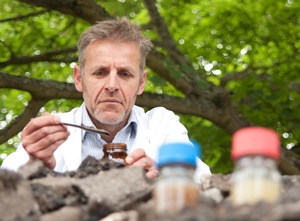Soil scientists unearth new scheme to tackle global problems
Release Date 13 October 2014

The University of Reading has been awarded new funding for soil science, and been given a key role in co-ordinating different aspects of UK research into soils.
Research councils BBSRC and NERC are working together, with partners, to fund three new initiatives to improve our understanding of soils, which are key to tackling many of today's global challenges, including food, water, and energy security, and climate change.
Soil is fundamental to our life support system, providing food, storing and filtering water, cycling nutrients and providing a habitat for many species. It is at the heart of our interaction with the environment and central to the responsible management of our planet. The world will need to produce 50% more food by 2030 to feed a growing world population and soil science is crucial to meeting this challenge.
The three initiatives - a Centre for Doctoral Training, the Global Food Security 'Soil and Rhizosphere Interactions for Sustainable Agri-ecosystems' (SARISA) programme and the appointment of a Soil Co-ordinator - bring together organisations with a shared interest in soil security and developing a new generation of highly-skilled scientists.
Four research projects - including one at the University of Reading - with a collective value of £5M, have been funded to investigate the interactions between soil and the communities of microbes that live in close association with plant roots.
More broadly, a team led by Professor Chris Collins at the University of Reading has been appointed to link the developing Soil Security Programme, the CDT and SARISA projects with other on-going research into soils to make sure that they work together and can maximise their impact.
Funding of £700k over five years has been provided for this dynamic role by BBSRC and NERC , including contributions from Defra and the Scottish Government.
This activity is part of the Soil Security Programme, which aims to secure future soil quality to sustain ecosystems and the services they deliver to people - such as food, flood and disease regulation, carbon storage and clean water. Supported by BBSRC, the Scottish Government and Defra, this NERC-led programme aligns closely to the Global Food Security Programme, which seeks to enhance the coordination of research and training for food security.
Minister for Universities, Science and Cities Greg Clark said: "Forging these strong partnerships between research councils and the three innovative new initiatives announced today are vital in addressing major challenges facing our society like feeding a growing population. By working together, the research councils can bring a range of perspectives to bear on these issues, ensuring that that excellent UK research is translated into tangible economic and societal benefits."
Among the new GFS-SARISA projects is research by the University of Reading's Dr John Hammond, from the School of Agriculture, Policy and Development, examining phosphorus cycling in the soil-microbe-plant continuum of agri-ecosystems.
Dr Hammond's team will use a variety of approaches to better understand the role plants and microbes living in the rhizosphere play in making phosphorus available for plant growth and how these roles change during plant development under field and laboratory conditions.
The microbes in the rhizosphere rely on carbon from the plant for growth. Under laboratory conditions the team will study plants that release different amounts of carbon into the rhizosphere and investigate the effects on the rhizosphere microbial community and the amount of phosphorus available for plant growth.
New opportunities for breeding crops that are more efficient at acquiring phosphorus may be possible, together with potential biotechnological applications for microbes and enzymes.
